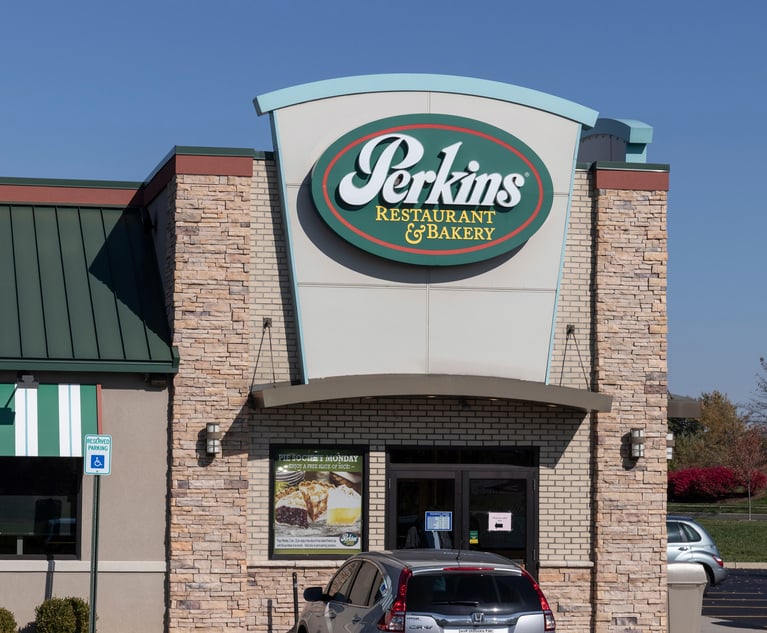Store Owner Can't Be Sued Over Murder, Ga. Appeals Court Rules
Two young lawyers made their first-ever oral arguments at the Georgia Court of Appeals for a negligent security case that may not be over.
February 11, 2019 at 06:11 PM
5 minute read
 Elissa Haynes, Goodman McGuffey, Atlanta (Courtesy photo).
Elissa Haynes, Goodman McGuffey, Atlanta (Courtesy photo).
In a case that may be appealed further, the Georgia Court of Appeals has ruled that a property owner cannot be held liable in a negligent security case over a murder in a convenience store parking lot.
Shaneku McCurty walked into a Stone Mountain convenience store to buy snacks at about 1 a.m. on Oct. 23, 2015. She made her purchases and left. Although her car was parked right outside the front door, an “unidentified assailant” shot and killed her before she could drive away, according to the opinion written by Judge Amanda Mercier and released Feb. 5.
McCurty's mother, Shirley Bolton, sued the convenience store owner and operator, Rikaz Food Inc., and its landlord, Golden Business Inc., “alleging that they failed to exercise ordinary care to keep the premises safe and allowed a dangerous condition to exist on the property, creating a nuisance,” Mercier said. “Golden moved for summary judgment, arguing that it was not responsible for McCurty's death or any damages suffered by Bolton. The trial court agreed. We find no error.”
The other members of the panel—Chief Judge Stephen Dillard and Presiding Judge Sara Doyle—concurred. They affirmed DeKalb County State Court Judge Stacey Hudrick in dismissing the case against the landlord.
“According to Bolton, Golden should have foreseen—and taken steps to prevent—the deadly assault in this case because people often loitered outside of Rikaz's convenience store, other violent crimes had occurred at the store, and the store was located in a high-crime area,” Mercier said. “It is true that the foreseeability of a criminal act 'may be established by evidence of one or more prior similar crimes,'” she said, citing Piggly Wiggly Southern v. Snowden, 219 Ga. App. 148 (1995). “The key question, however, is the landowner's superior knowledge of the criminal activity.”
Mercier said Karim Aly, Golden's sole owner, “testified that he thought Rikaz's store was located in a safe area based on his examination of the property and surrounding neighborhood, and he did not know about any prior crimes in or around the store.” Yes, Golden equipped the store with bulletproof glass and security cameras in 2000, but Aly testified that “he incorporates these safety measures in all stores that Golden builds or operates, regardless of store location and partly for insurance purposes,” Mercier said.
The mother has “pointed to no evidence that Aly witnessed criminal activity or misconduct” during his visits to check on the store, or that he had been “informed him about crimes or other problems,” she said.
Elissa Haynes of Goodman McGuffey, who represented Golden along with partner Robert Luskin, said, “It was a welcome win in light of the recent large negligent security verdicts in similar cases.”
“Recent verdicts and trial court opinions have muddied the water and often applied the constructive knowledge element found in slip and fall cases to cases involving shootings at gas stations and apartments,” Haynes said. “This opinion helps clarify the standard for what degree of knowledge is necessary and reiterates that there must be some evidence of the premises owner's knowledge of prior substantially similar crime or evidence of a propensity for crime before the premises owner can be held liable.”
Haynes said it was her first time presenting oral argument at the Georgia Court of Appeals. She was so nervous she had to ask Luskin to drive her and reviewed her notes en route, she said.
But after the opinion came out, she said the experience was a career highlight. The panel had a lot of questions, and the firm on the opposite side was “easy to work with” and “not contentious,” she said.
That was the Summerville Firm.
“You know they're going to treat you with respect, and you'll do the same,” Haynes said.
 Max Thelen, with The Summerville Firm in Atlanta.
Max Thelen, with The Summerville Firm in Atlanta.Maxwell Thelen of the Summerville Firm was also making his first oral argument at the Court of Appeals.
“It was a pleasure to argue this case with Elissa. She is a skilled and professional adversary and the case is an interesting one,” Thelen said over the weekend in an email from Iraq, where he is deployed at the moment with his Georgia Army National Guard unit.
“Regarding the outcome, we are a bit disappointed in the decision because it seems to overlook the significant body of case law that reiterates that a property owner is not free to ignore a duty to take reasonable action to make his premises safe,” Thelen said. “Decades-old precedent holds that a premises owner cannot bury his head in the sand and escape liability for what he should have known if he had attended to the duties he owed. We are still evaluating our options, but will likely ask the Court of Appeals to reconsider in light of that precedent.”
The case is Bolton v. Golden, No. A18A1600.
This content has been archived. It is available through our partners, LexisNexis® and Bloomberg Law.
To view this content, please continue to their sites.
Not a Lexis Subscriber?
Subscribe Now
Not a Bloomberg Law Subscriber?
Subscribe Now
NOT FOR REPRINT
© 2025 ALM Global, LLC, All Rights Reserved. Request academic re-use from www.copyright.com. All other uses, submit a request to [email protected]. For more information visit Asset & Logo Licensing.
You Might Like
View All

Hungry for Stability After Execs Exit, Papa John's Gives Legal Chief Big Retention Bonus
4 minute read
Walmart Ordered to Pay $1.2M by State Jury for Employee-Caused Injury in Georgia Store

Trending Stories
- 1In Novel Oil and Gas Feud, 5th Circuit Gives Choice of Arbitration Venue
- 2Jury Seated in Glynn County Trial of Ex-Prosecutor Accused of Shielding Ahmaud Arbery's Killers
- 3Ex-Archegos CFO Gets 8-Year Prison Sentence for Fraud Scheme
- 4Judges Split Over Whether Indigent Prisoners Bringing Suit Must Each Pay Filing Fee
- 5Law Firms Report Wide Growth, Successful Billing Rate Increases and Less Merger Interest
Who Got The Work
J. Brugh Lower of Gibbons has entered an appearance for industrial equipment supplier Devco Corporation in a pending trademark infringement lawsuit. The suit, accusing the defendant of selling knock-off Graco products, was filed Dec. 18 in New Jersey District Court by Rivkin Radler on behalf of Graco Inc. and Graco Minnesota. The case, assigned to U.S. District Judge Zahid N. Quraishi, is 3:24-cv-11294, Graco Inc. et al v. Devco Corporation.
Who Got The Work
Rebecca Maller-Stein and Kent A. Yalowitz of Arnold & Porter Kaye Scholer have entered their appearances for Hanaco Venture Capital and its executives, Lior Prosor and David Frankel, in a pending securities lawsuit. The action, filed on Dec. 24 in New York Southern District Court by Zell, Aron & Co. on behalf of Goldeneye Advisors, accuses the defendants of negligently and fraudulently managing the plaintiff's $1 million investment. The case, assigned to U.S. District Judge Vernon S. Broderick, is 1:24-cv-09918, Goldeneye Advisors, LLC v. Hanaco Venture Capital, Ltd. et al.
Who Got The Work
Attorneys from A&O Shearman has stepped in as defense counsel for Toronto-Dominion Bank and other defendants in a pending securities class action. The suit, filed Dec. 11 in New York Southern District Court by Bleichmar Fonti & Auld, accuses the defendants of concealing the bank's 'pervasive' deficiencies in regards to its compliance with the Bank Secrecy Act and the quality of its anti-money laundering controls. The case, assigned to U.S. District Judge Arun Subramanian, is 1:24-cv-09445, Gonzalez v. The Toronto-Dominion Bank et al.
Who Got The Work
Crown Castle International, a Pennsylvania company providing shared communications infrastructure, has turned to Luke D. Wolf of Gordon Rees Scully Mansukhani to fend off a pending breach-of-contract lawsuit. The court action, filed Nov. 25 in Michigan Eastern District Court by Hooper Hathaway PC on behalf of The Town Residences LLC, accuses Crown Castle of failing to transfer approximately $30,000 in utility payments from T-Mobile in breach of a roof-top lease and assignment agreement. The case, assigned to U.S. District Judge Susan K. Declercq, is 2:24-cv-13131, The Town Residences LLC v. T-Mobile US, Inc. et al.
Who Got The Work
Wilfred P. Coronato and Daniel M. Schwartz of McCarter & English have stepped in as defense counsel to Electrolux Home Products Inc. in a pending product liability lawsuit. The court action, filed Nov. 26 in New York Eastern District Court by Poulos Lopiccolo PC and Nagel Rice LLP on behalf of David Stern, alleges that the defendant's refrigerators’ drawers and shelving repeatedly break and fall apart within months after purchase. The case, assigned to U.S. District Judge Joan M. Azrack, is 2:24-cv-08204, Stern v. Electrolux Home Products, Inc.
Featured Firms
Law Offices of Gary Martin Hays & Associates, P.C.
(470) 294-1674
Law Offices of Mark E. Salomone
(857) 444-6468
Smith & Hassler
(713) 739-1250






